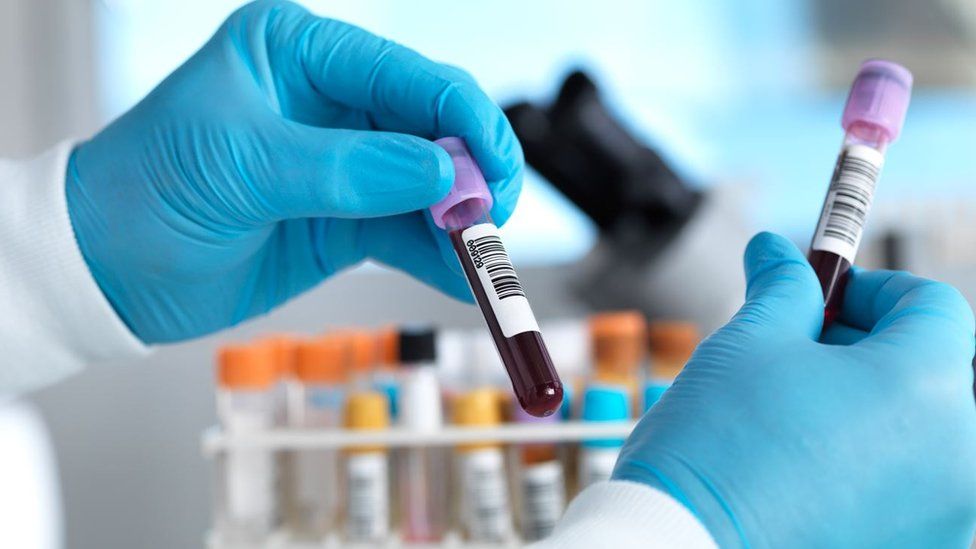ARTICLE AD BOX
By Nick Triggle
Health correspondent
 Image source, Getty Images
Image source, Getty Images
More than 4,000 UK victims of the infected blood scandal are to receive interim compensation of £100,000 each, the government has announced.
It will be given to those whose health is failing after developing blood-borne viruses like hepatitis and HIV as well as partners of people who have died.
It is the first time compensation will be paid after decades of campaigning.
Families welcomed the news but said there were many people, like bereaved parents, who would miss out.
The payments will be made by the end of October for those in England. Those living in Scotland, Wales and Northern Ireland will also receive the money.
It comes after the chair of the public inquiry, Sir Brian Langstaff, said there was a compelling case to make payments quickly - and victims were on borrowed time because of failing health.
Currently, victims and families get financial support payments - and for some these will have run into tens of thousands of pounds.
But this is the first time the government has agreed to a compensation payment for things such as loss of earnings, care costs and other lifetime losses.
The government said the compensation would be tax-free and not affect the support payments these people are receiving.
Prime Minister Boris Johnson said: "While nothing can make up for the pain and suffering endured by those affected by this tragic injustice, we are taking action to do right by victims and those who have lost their partners."
This could be just the first stage of compensation payments as the inquiry is looking into whether more payouts should be paid to a greater number of people.
'NHS's worst-ever treatment disaster'
The contaminated blood scandal has been called the worst treatment disaster in the history of the NHS.
Thousands of NHS patients with haemophilia and other blood disorders became seriously ill after being given a new treatment called factor VIII or IX from the mid-1970s onwards.
At the time the medication was imported from the US where it was made from the pooled blood plasma of thousands of paid donors, including some in high-risk groups, such as prisoners.
If a single donor was infected with a blood-borne virus such as hepatitis or HIV then the whole batch of medication could be contaminated.
Image source, Factor VIII/Marc marnie
Image caption,Factor VIII was imported from the US in the 1970s and 1980s
An unknown number of UK patients were also exposed to hepatitis B or C though a blood transfusion after childbirth or hospital surgery.
At least 2,400 people died after contracting HIV or hepatitis C through NHS treatments in the 1970s and 80s.
A 'significant development'
Over the years, the government has put in place a number of schemes offering victims financial support without any admission of liability but, unlike in the Republic of Ireland and some other countries, compensation has never been paid to individuals or families affected.
In July public inquiry chairman Sir Brian said individuals who currently qualify for financial support, including some bereaved partners of those killed, should now be offered interim compensation of £100,000 each.
Final recommendations on compensation for a wider group of people are expected when the inquiry concludes next year.
Video statements were played at the start of the public inquiry in September 2018
An independent study commissioned by the government, published last month, said victims should eventually be compensated for physical and social injury, the stigma of the disease, the impact on family and work life, and the cost of care.
It recommended that partners, children, siblings and parents of those who had been infected should be eligible for payments too.
If the inquiry and the government accept those proposals completely then it is possible the final bill could be more than £1bn.
The recipients of the interim compensation payments are people who are already registered for financial support payments, but campaigners say there could be tens of thousands of others who have not yet come forward.
Kate Burt, chief executive of the Haemophilia Society, said: 'Finally, after nearly five decades the government has accepted it must pay compensation to those infected as a result of the contaminated blood scandal.
"This is a significant development. However, the majority of the bereaved - including parents and the children of those who died - will receive nothing.
"Steps must be taken now to set up a workable scheme which can deliver full compensation quickly and fairly to all those who suffered devastating loss because of this NHS treatment disaster.'

 2 years ago
33
2 years ago
33








 English (US) ·
English (US) ·